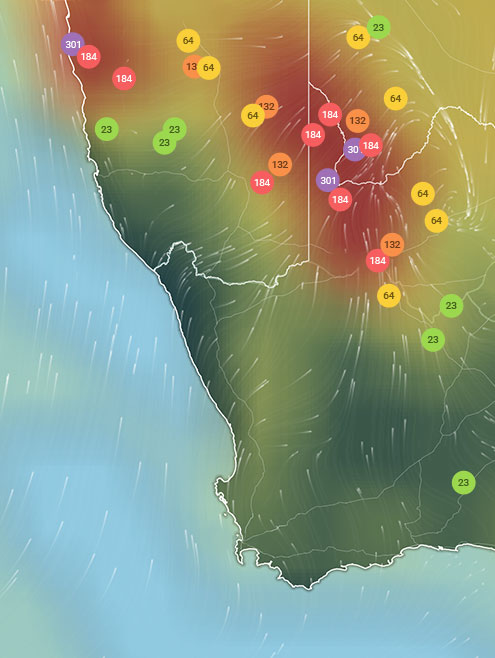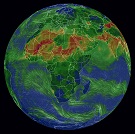Get a monitor and contributor to air quality data in your city.
26.7K people follow this city






AIR QUALITY DATA CONTRIBUTORS
Find out more about contributors and data sources| Weather | Scattered clouds |
| Temperature | 84.2°F |
| Humidity | 19% |
| Wind | 15 mp/h |
| Pressure | 29.6 Hg |
| # | city | US AQI |
|---|---|---|
| 1 | Karabuk, Karabuk | 116 |
| 2 | Izmit, Kocaeli | 80 |
| 3 | Istanbul, Istanbul | 78 |
| 4 | Gaziantep, Gaziantep | 77 |
| 5 | Sultangazi, Istanbul | 77 |
| 6 | Manisa, Manisa | 75 |
| 7 | Sakarya, Sakarya | 73 |
| 8 | Mersin, Mersin | 66 |
| 9 | Antalya, Antalya | 65 |
| 10 | Bursa, Bursa | 63 |
(local time)
SEE WORLD AQI RANKING
| # | station | US AQI |
|---|---|---|
| 1 | Besirli | 59 |
(local time)
SEE WORLD AQI RANKINGUS AQI
59
live AQI index
Moderate
| Air pollution level | Air quality index | Main pollutant |
|---|---|---|
| Moderate | 59 US AQI | PM2.5 |
| Pollutants | Concentration | |
|---|---|---|
| PM2.5 | 15.7µg/m³ | |
| PM10 | 51.6µg/m³ | |
| O3 | 0µg/m³ | |
| NO2 | 0µg/m³ | |
| SO2 | 0µg/m³ | |
| CO | 465.2µg/m³ | |
PM2.5
x3.1
PM2.5 concentration in Trabzon is currently 3.1 times the WHO annual air quality guideline value
| Sensitive groups should reduce outdoor exercise | |
| Close your windows to avoid dirty outdoor air GET A MONITOR | |
| Sensitive groups should wear a mask outdoors GET A MASK | |
| Sensitive groups should run an air purifier GET AN AIR PURIFIER |
| Day | Pollution level | Weather | Temperature | Wind |
|---|---|---|---|---|
| Monday, Apr 15 | Moderate 79 AQI US | 59° 51.8° | ||
| Tuesday, Apr 16 | Moderate 65 AQI US | 68° 55.4° | ||
| Wednesday, Apr 17 | Moderate 55 AQI US | 75.2° 64.4° | ||
| Today | Moderate 59 AQI US | 84.2° 60.8° | ||
| Friday, Apr 19 | Moderate 51 AQI US | 62.6° 53.6° | ||
| Saturday, Apr 20 | Good 50 AQI US | 66.2° 53.6° | ||
| Sunday, Apr 21 | Moderate 53 AQI US | 64.4° 55.4° | ||
| Monday, Apr 22 | Moderate 74 AQI US | 62.6° 55.4° | ||
| Tuesday, Apr 23 | Moderate 76 AQI US | 60.8° 55.4° | ||
| Wednesday, Apr 24 | Moderate 66 AQI US | 73.4° 59° |
Interested in hourly forecast? Get the app
Trabzon historically known as Trebizond in English, is a city on the Black Sea coast of northeastern Turkey and the capital of Trabzon Province. It is situated on the Black Sea coast, historically part of The Silk Road.
According to a census which was conducted in 2012, the estimated population of Trabzon was 313,000 people.
Towards the middle of 2021, Trabzon was going through a period of “Good” quality air with a US AQI reading of 37. This United States Air Quality Index number is an internationally used set of metrics supported by the World Health Organisation (WHO) and is used to compare the air quality in different cities throughout the world using comparable standards. It is calculated by using the concentrations of the six most commonly found pollutants. If figures for all are not available, the figure is calculated using what information there is. In Trabzon, all six pollutants were recorded as follows: PM2.5 - 9 µg/m³, PM10 - 22.4 µg/m³, ozone (O3) - 12.6 µg/m³, nitrogen dioxide (NO2) - 10.1 µg/m³, sulphur dioxide (SO2) - 4.3 µg/m³ and carbon monoxide (CO) - 315.5 µg/m³.
With a relatively low level of pollution such as this, the advice given is to open doors and windows to allow the increase in fresh air flowing through the rooms. And all types of outdoor activity can be enjoyed without fear. The table published at the top of this page will help you decide what to do.
Air quality is very unstable as it is easily affected by many things. The seasons of the year, wind speed and direction and length of sunlight hours can all affect air quality.
Looking back at the figures released by the Swiss air monitoring company, IQAir.com for 2020, it can easily be seen that Trabzon enjoyed “Moderate” quality air throughout the entire year. The figures varied between 12.1 and 35.4 µg/m³.
Records regarding air quality were first kept in Trabzon in 2019 when the average annual figure was recorded as being 22.3 µg/m³, the following year saw a slight decline with a figure of 23.7 µg/m³.
However, this may not be an accurate reflection of reality because of the restrictions imposed due to the COVID-19 pandemic. Many vehicles were no longer used because their drivers were furloughed and not required to commute to and from work on a daily basis. There were also many factories and other non-essential production units which were temporarily closed in an attempt to prevent the spread of the virus.
Unplanned urbanisation, population growth, migration to cities, unplanned industrial zones and traffic management are among the main causes of air pollution.
Most of the polluted air in Trabzon comes from the use of fossil fuels as a source of heat, especially in the colder, winter season.
Turkey was ranked 46th in the 2020 World Air Pollution Report, which covers 106 countries, down three places. According to the report, the cities with the most air pollution in Turkey were Çorum, Erzurum and Düzce. Trabzon was also included in the list.
In order to improve air quality, various legal regulations are in force in Turkey, as in all developed countries. Some of these are related to the control of polluting sources such as industry, heating and traffic, and some of them are related to the quality of the air we breathe. The aim of the regulations on pollution control is to provide air quality targets set to prevent or reduce the harmful effects of air pollution on human health and the environment.
Solid fuels are controlled and minimised, pollution from motor vehicles is controlled and a large part of the city (80 per cent) has switched to natural gas, PM10 air pollution has not decreased.
The use of natural gas, which has cleaner chimney emissions compared to other fuels, should be expanded in the city. In order to increase the use of natural gas, natural gas prices should be reduced. Instead of the coal distributed to low-income citizens, financial support should be provided and encouraged for the installation of natural gas in the residences of these citizens. In fact, natural gas bills should be supported at least as much as coal aid.
Public transportation should be expanded instead of using private vehicles and comfortable, fast rail and electric public transportation vehicles should be developed.
PM 2.5 is called 'fine particulate matter’. The pollutant arises when the substances released directly from a certain source interact chemically with the gases in the atmosphere and remain in the air for a long time, causing pollution. This situation brings with it serious health problems. Particles are divided into two basic categories: industrial particulate matter formations and particles originating from natural events. Industrial particulate matter formations; fossil fuel power plants, industrial establishments and motor vehicles can be cited as examples. We can even count wood and coal used for heating purposes in homes.
Because they are small and light, they stay in the air longer. This increases the likelihood of humans and animals inhaling particles, leading to many health problems. It is also seen that particulate substances create more harmful effects on human and animal health and even nature as a result of chemical reactions with gases and other particulate substances in the air. However, the tendency to stay in the air for a long time also causes an increase in the negative effects of global warming. The impact of this situation on the loss of biodiversity should not be ignored.
The cause of diabetes is toxins due to air pollution. The body is exposed to these toxins. As a result, as the endothelial tissue deteriorates, it becomes difficult for insulin resistance and the hormone to affect the body. Therefore, insulin resistance, heart problems, metabolic disorders develop. All of these increase the risk of diabetes.
Weight control is very important to prevent diabetes. Because of weight insulin resistance, insulin resistance and diabetes are directly related. Unfortunately, obesity is seen in one of every three people in Turkey. The latest data says obesity prevalence is 32 per cent, which equates to one out of every three people.
1Contributor
Government Contributor
1 station
1 Data source